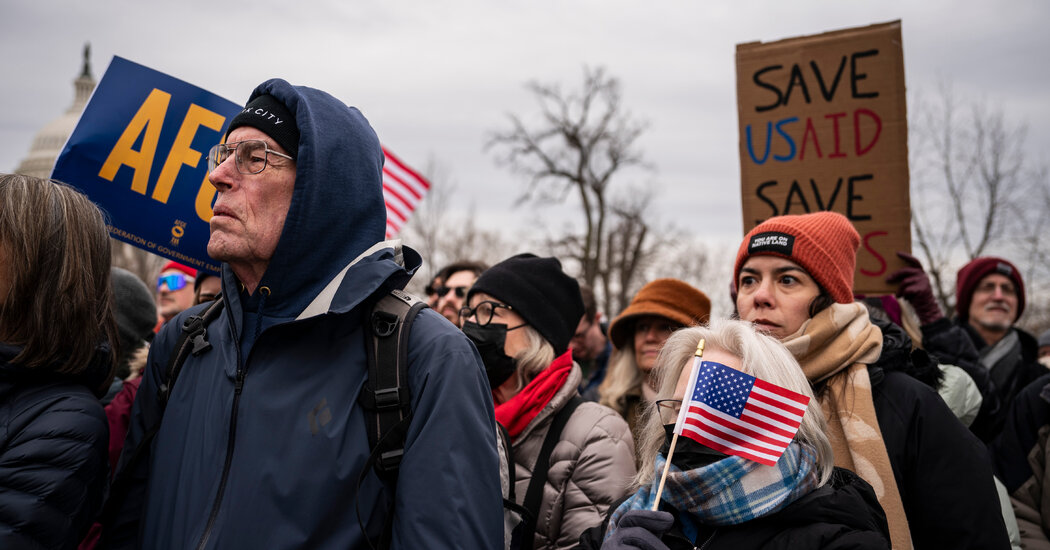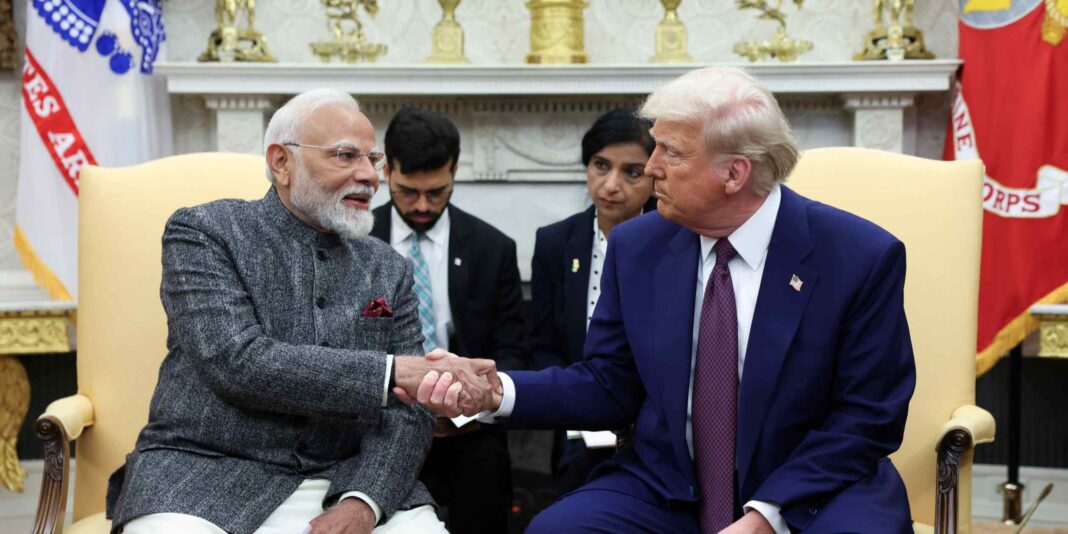A federal judge on Thursday moved to extend by one week a temporary restraining order preventing the Trump administration from carrying out plans that would all but dismantle the U.S. Agency for International Development.
The order, which Judge Carl Nichols of the U.S. District Court for the District of Columbia said he would file later Thursday, continues to stall a directive that would put a quarter of its employees on administrative leave while forcing those posted overseas to return to the United States within 30 days.
Judge Nichols said he would rule by the end of next week on whether to grant the plaintiffs’ request for a preliminary injunction that would indefinitely block key elements of the high-profile Trump administration effort.
The plan was driven in large part by Elon Musk, the billionaire tech entrepreneur tasked with making cuts to the federal budget, to shutter an agency he and Mr. Trump have vilified. The Trump directive would affect about 2,700 direct hires of U.S.A.I.D., including hundreds of Foreign Service officers.
The lawsuit was filed by two unions representing the affected U.S.A.I.D. employees: the American Foreign Service Association, to which aid workers in global missions belong, and the American Federation of Government Employees, which represents other direct hires. They have argued that President Trump’s executive order freezing foreign aid for 90 days and subsequent directives to dismantle certain U.S.A.I.D. operations and reduce staff were unconstitutional, and have asked the court to overturn them.
Democratic lawmakers, U.S.A.I.D. workers, and the aid organizations that depend on U.S. foreign assistance have decried any moves to unilaterally shut down the agency as unlawful, as its role in the federal government was established by law and Congress funded it, like the rest of the government, through March 14.
During a hearing on Thursday, Judge Nichols pressed Karla Gilbride, the lawyer for the plaintiffs, on why being placed on administrative leave would cause irreparable harm to the employees.
He also asked Ms. Gilbride a series of questions about why the unions and the employees they represent had not first sought relief through established arbitration processes for the federal work force — an argument that the Justice Department had made in its responses to the lawsuit.
Ms. Gilbride said that if employees went through an arbitration process, there might not be a U.S.A.I.D. left to employ them by the time their cases were considered.
“This court is the only forum that can address these harms on the time scale that this urgent situation demands,” she said, noting that the administrative processes in question were designed to handle the grievances of individual employees, not an entire federal agency on the brink of dissolution.
Whether federal employee unions can experience the direct harm necessary to file a lawsuit — a concept known as standing — became an issue in another case against the Trump administration.
Unions, including the American Federation of Government Employees, challenged an offer to pay federal workers through September if they agreed to resign. The judge in that case, George A. O’Toole of the U.S. District Court for the District of Massachusetts, ruled on Wednesday that the unions did not have the standing to sue because they had not been directly affected by the offer.
Judge O’Toole also noted that Congress had established administrative processes for raising the type of claims at issue in the case.
Eric Hamilton, the Justice Department lawyer, made a similar argument about the U.S.A.I.D. employees on Thursday, pointing to the existence of administrative processes for settling labor disputes involving the federal work force.
“We certainly don’t think unions coming to district court is the right form to litigate,” he said.
But those administrative processes can take years, and Mr. Trump has also targeted some of them. On Monday, he fired the chairwoman of the Merit Systems Protection Board, which hears appeals to firings and other disciplinary actions against federal employees.
Ms. Gilbride on Thursday made a series of arguments about the uncertainties and dangers facing workers stranded overseas and in bureaucratic limbo, some of whom submitted testimonials about being in physical danger and struggling to get security guidance because they were unable to access their accounts to receive official communications. These included several officers posted to the Democratic Republic of Congo, who described how they were left to determine whether and how to flee Kinshasa amid protests, as demonstrators approached their houses and, in one case, looted all of one officer’s belongings.
Ms. Gilbride said they and the rest of the U.S.A.I.D. Foreign Service officers had been “forced under extreme time pressure” to choose whether to uproot their families and return to the United States, with the understanding that the Trump administration would not extend relocation assistance to those who resisted departing on the U.S. government’s timeline.
Mr. Trump’s political appointees and Mr. Musk, labeled a “special government employee” by the White House, are aiming to cut most of the around $70 billion of annual foreign aid money that is allocated through congressional mandates and legislation. About $40 billion of that amount is funneled through U.S.A.I.D., accounting for less than 1 percent of the annual federal budget.
Mr. Hamilton defended planned cuts to the agency’s work force as falling within Mr. Trump’s purview. He acknowledged the unique safety risks employees in high-risk locations faced and assured Judge Nichols that the administration was taking steps to protect them.
“You can understand, I’m sure, why I would not want to be in the position of having government employees overseas be at risk because they are placed on administrative leave,” Judge Nichols said.
“We share the concern about the security of U.S.A.I.D. employees,” Mr. Hamilton said.
Pressed by the judge to detail those additional measures, Mr. Hamilton said he did not know what they were.
Judge Nichols instructed him to provide the court with details about the safety measures. He also asked Mr. Hamilton to give the court information about what the administrative leave status meant for other nonsalary benefits that come with an overseas employee’s post, such as diplomatic housing and school tuitions.
The government has said employees on administrative leave would continue to be paid, but U.S.A.I.D. Foreign Service officers expect that they would lose many of the additional benefits afforded to those who work globally if they are forced to return to the United States. For an officer without a home base in the United States, losing those benefits could force a dip into savings to keep a roof over their head.
It is also not clear how long employees put on administrative leave would remain on that status.
Lawyers for the Trump administration have said that officials had determined that only 611 of U.S.A.I.D.’s approximately 10,000 workers were too “essential” to be put on administrative leave or terminated, for now. They defended the drastic planned cuts by arguing in court documents that “the president’s powers in the realm of foreign affairs are vast and generally unreviewable.”
The lawsuit is one of several seeking to beat back the Trump administration’s efforts to severely restrict foreign aid, which has affected not just U.S.A.I.D.’s work force, but the global network of aid organizations that depend on the U.S. to carry out humanitarian, health and development programs.
Another suit pending before the U.S. District Court for the District of Columbia, brought by a group of contractors and nongovernmental organizations who lost funding, asks the court to order the administration to restart disbursements of foreign aid funds and stop the dismantling of U.S.A.I.D.


